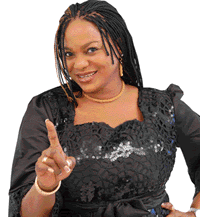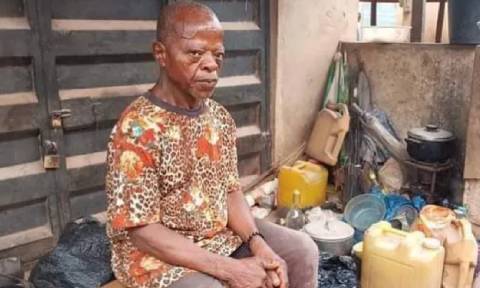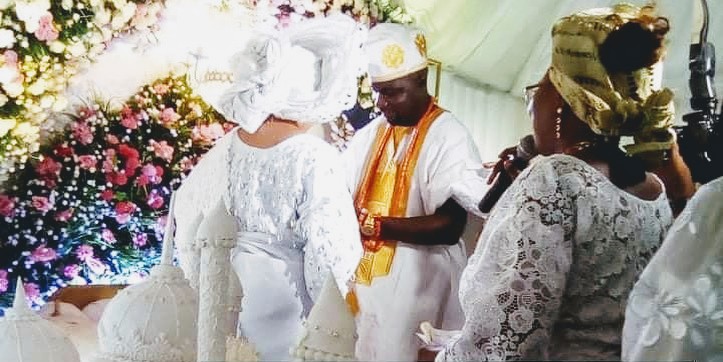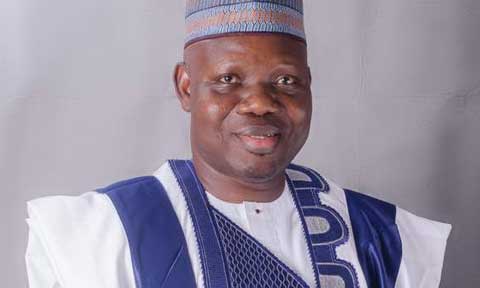
Actress, script writer, producer, song writer and aspiring singer, Shan George is one woman to be reckoned with. Having acted in almost a hundred movies since 1998, twenty of which she produced; Shan recently released her music album titled ‘Nkenkene’. This album borne out of her desire to preserve the culture, especially the folk songs of her people endeared her to them and earned her the title of ‘Bahumono Princess’. Born to a British father and a Nigerian mother, Shan is one mixed-blood who refers to herself as a bush-girl.
As a young girl growing up in the village (her mother had moved from Enugu to live in the village after Shan’s father died), she knew she wanted to be in the limelight, the television to be precise. But to her appearing on television meant she would need to read what she calls ‘big big’ books, get married to either a governor or a president, become a first lady and be seen on television carrying out one project or the other. But therein lied the challenge for her, how was she going to achieve that dream?
According to Shan, in the village where she grew up, girls were groomed to get married as early as 15 years and as such they were not being educated. Parents saw it as a waste of resources since they believed the girls would eventually get married and their husband’s would take the glory instead. So for her, the only option available to her in achieving her dream would be to get married to a man who would take her out of the village to the ‘township’ and from there she could get educated and become a very important person.
However, at 21, six years into her marriage, two sons and nowhere near her dream, Shan knew she had to take her destiny in her hands. In this exclusive interview with Off the Record, read how she was able to go against all odds to achieve her dreams. Excerpts:
OFF THE RECORD: When and where were you born?
SHAN: I was born at Enugu in the 70s, on April 21st. My dad used to work in a company there called ‘Turners Asbestos’, while my mum used to work at the teaching hospital. They met there and I am the product of that meeting.
OTR: Where did you grow up?
S: Actually, I grew up in my village because a couple of years later, my dad died and my mum had to move back to her village, Ediba in Cross-River state.
OTR: How long did you live there?
S: I was in the village till I became an adult. That’s where I went to primary and secondary school; got married. So, you see I’m a typical bush girl (laughs).
OTR: So, how was it like growing up in the village?
S: Normal. You wake up in the morning go to school as usual, you know. In the village, you do not have lots of cars; at that time there was no electricity, no pipe-borne water. We lived by the river so we didn’t have the problem of getting water. In the village we knew the importance of good hygiene, so we used to go to the stream to fetch fresh water to drink, while we did our washing with water from the river. People there are basically farmers and fishermen. We go to farm and it was fun. We ate lots of fresh foods.
OTR: When you were in the village, what kind of life did you dream of?
S: No, in the village we were not opportuned to dream. But I remember when I was about 12 years because there was no electricity; we did not really have too many people who had television sets. So the only TV set I knew was miles away from our home and we only got to watch TV on Sundays because that was the only day in a week most parents allow children to relax and have a good time. It was a small black and white TV that we used to watch from the window. And I remember vividly then that the most interesting TV programmes I wanted to watch were ‘CI5’ and ‘Mirror in the Sun’. And I also remember at that time thinking that people on TV are not people from this earth; I used to think people on TV where from outer space. And somehow in my small kid mind, I felt to be on TV, you must be really educated probably to be able to go to space where you can now appear on TV. If I had any dream at all then, it was to get educated. My favourite dream then was going to school, I also thought to be on TV, I had to read ‘big big’ books and after that I’ll marry someone like a president or a governor to appear on TV (laughs).
OTR: So now you have read the ‘big big’ books and you are not married to a governor or a president and you are on TV, how did you do it?
S: Actually, in my place as a young girl, when you’re getting to the age of 15, you’re seen as matured and basically groomed for marriage. Though things have changed now, at that time, as young girls, we all looked forward to getting married. Some of us cherished good things and wanted a man who lived in the city; who will come and take us away and I was one of those girls who liked ‘beta tins’ (good things). I got lucky and got a man who took me out of the village to ‘township’ (city). When I got there I discovered that a whole lot of things were very different; the orientation we had. For example, in the village we were taught that if you look into a man’s eyes, you’ll get pregnant.
I got to the township with a decision, because when I got into school I knew there was no one to fend for me. I knew I had to pay my fees, so I was looking for what to do to make money. That was how I got into acting through a sister of mine, Blessing, she used to play ‘Nwanga’ in NTA’s rested soap ‘Fortunes’. She introduced me to acting through the late Jennifer and Emeka Ossai. They were going to produce a movie titled ‘Thorns of Rose’, and some how I got a role in the movie. I was paid 20, 000 Naira and that was a lot of money. So when I got into the University of Lagos (UNILAG), paying my school fees was not a big problem anymore. That was in 1996.
OTR: So how far did you go with education in the village?
S: Secondary school. Between then and when I went to UNILAG, I had already gotten married, had two children and left my husband. I started writing GCE, JAMB before I finally got into school to study Mass Communication. By that time, I had started writing stories.
OTR: You spoke about your coming to the township, where exactly did you go to?
S: Lagos. Can you imagine, it was like from frying pan to fire? Coming from my very small village to Lagos was a big challenge, even though now I can proudly call myself a Lagosian (laughs).
OTR: Why did you have to work to pay your fees even after getting your dream man who took you to township so you could get educated?
S: I got married just after I left secondary school and immediately I started having kids. It was not as if I had lost focus at that time but some other things overtook the ambition for a while because I had to take care of my kids to some certain stage.
I still wanted to go back to school and pursue my dreams but it was tough having a family and pursuing my dream.
But people around me didn’t think it was a wise thing to do, they didn’t think it was important. In fact, I was so lucky to have finished secondary school because there were only few of us who finished secondary school at that time I was in the village and I thank my mum for that. To them, the path of my life had been set; I had finished secondary school, I could read and write, I was married, had two kids, what more could I ask for?
I didn’t think and see it that way, I’m sorry about that but it did not go down well with me. It got to a point where I knew that the only way to pursue my dream was to leave the marriage. So I left the marriage. When I left the marriage, virtually everybody turned their backs on me, including my mother.
OTR: Did you leave the marriage specifically to fulfill your dream; there was no maltreatment from your husband?
S: No, no, it wasn’t because of maltreatment. If it was that, I wouldn’t have left the marriage. Normally in Nigeria, I don’t think they are up to 10% of men who don’t beat their wives, they are very few. Quite alright, I was being hit but that was not why I left. I left the marriage because I wanted to go to school.
For my ex-husband…, well we were both very young, I was a bit over 20 and he was not much older. If it was now, I’m sure a whole lot of things would have been different. The age also had its role to play, this was this young man who wanted to cruise town and then there’s this naïve village girl hooked on his neck and children were also coming.
Now I look at it as an adult and I see that it was not anybody’s fault. I wanted to go to school and he was also thinking about his own vision to pursue. I think at that time nobody seemed to be bothered about me, so I had to take the bull by the horn. Then I was already 21 with two kids, when I left, my first son was almost six.
OTR: So how did you cope, having to work and take care of two children alone?
S: I didn’t take the kids with me at that particular moment because I wasn’t even sure of where I was going. I didn’t even have anywhere to go. I was comfortable then, I wasn’t married to a poor man; we were not lacking anything. So, I couldn’t imagine taking my kids when I wasn’t even sure of where I was going. Besides their father’s house was more comfortable, there was also a nanny, Evelyn there at that time that really took care of them, though I used to go there almost everyday to see them because I couldn’t stay without seeing them. I was in a fix. I didn’t have a brother or a sister or anybody to confide in, so I was all alone.
However, a couple of years later after I had gotten into school, everybody who cut me off started coming back to make peace with me, saying now they believe me because there’s this belief in my village that a woman who leaves her husband’s house is a prostitute. When I got into school, it was like proving them all wrong. My ex-husband also made up with me and started allowing the children to come and spend time with me.
OTR: Why didn’t you go back to the marriage?
S: I got admission into school say about three to four years after I left the marriage and there had been a lot of gap. I will just say that we had both grown apart from each other at that time and had moved on. It was a difficult time, it was a phase. Now when I look back at time and my experience, I just know that was the way it was meant to be and there was nothing I could have done about it.
OTR: Between Thorns of Rose and now, how far have you gone in your career?
S: I have played roles in many movies. I started acting in 1996 and in 1998; I shot my first movie titled ‘All for Winnie’. Then I was in my final year in the university, since then I have produced almost 20 movies and about half of it I wrote myself. I’ve acted in about a hundred or more movies, I’m not sure of the exact number. The latest movie I just produced is titled ‘Super Zebra Man’ and right now, it is at the editing stage.
OTR: You no longer act in as many movies as you used to. Why is that?
S: The number one reason is the fact that I am producing my movie and that takes a whole lot of my time that it makes me practically unavailable most times.
The second reason is that my kids are in England and so whether I like it or not, I have to go to London to spend time with them a couple of times in a year, say 5 weeks or a couple of months. When I get there, I have to stay at home with them, cook their meals, and do the usual things because I’m not always there with them. No matter what I’m doing, my children come first. So sometimes when the need arises, I leave whatever I’m doing to go be with them. When I’m there and you call me for a job, I’ll simply decline because at that time, I’m unavailable.
Another reason is that when you’ve risen to the point where some of us have in the industry, you don’t come that cheap. So, most producers don’t feel they are financially capable to call me. Some of them are also new in the industry and so they try to prune their budget, when this happens, people like me will be off the radar.
OTR: Now that you have released a music album into the market, is it like a one-off thing?
S: I hate loose times; I am the kind of person who doesn’t like sitting around doing nothing while the whole world is moving forward. So when I have loose times I like to do something and in between jobs I write. When I was asked to get involved in the Calabar Carnival a couple of years back, I just taught, hey this is a carnival; it’s not like I’m expected to come and show a movie. So I decided to do something for my people. It was a thirty-one day event; we had artistes playing daily. We also had a chance to display our own cultural music. I could have done Hip-Hop but I wanted to do our cultural music and because I am a very native person I did something in my own dialect for my people and to show everybody out there what we are made of.
OTR: What dialect is it?
S: It is called the Bahumono and for your information; I am now the Bahumono Princess (laughs). That’s how I got into music and I decided to go to the studio to produce songs I can perform on stage for the carnival. I write the songs in my language and I also have a couple of folk songs that I revised. Songs that we sang as kids when listening to moonlight tales. Some few years back, I went home and gathered some children for a moonlight tales but I was surprised most of them did not know the songs and I was like My God, are these songs going to die like that? So when the carnival thing came up I had to include some old songs just to refresh the minds of my people. There’s ‘Nkenkene’, there’s ‘Ogogo’ and the latest one I just did with Sunny Neji titled ‘Ababa’, the video is being played on air right now and also on you tube.
OTR: So, did you make money from your Nkenkene album?
S: Money! My number one intension was not to make money. It was more like doing it for my people and I tell you the truth, I have made money from this album. I’m surprised I made money and the little I made from Nkenkene which I didn’t expect was very highly appreciated. I have performed at the carnival, some traditional marriages and I also performed at Governor Bola Tinubu’s birthday party and I got paid for all these performances.
OTR: What’s style to you?
S: Anything that makes me comfortable. However, it also depends on the occasion too. If I have to attend an event, I go with the flow.
OTR: Thank you very much for your time Shan.



















